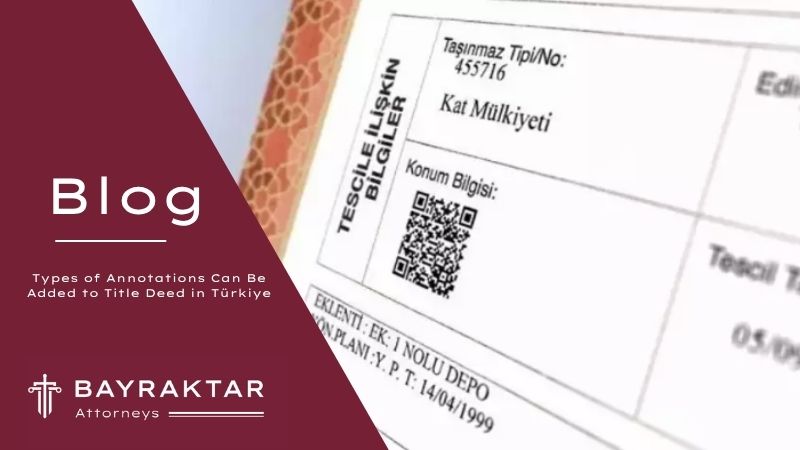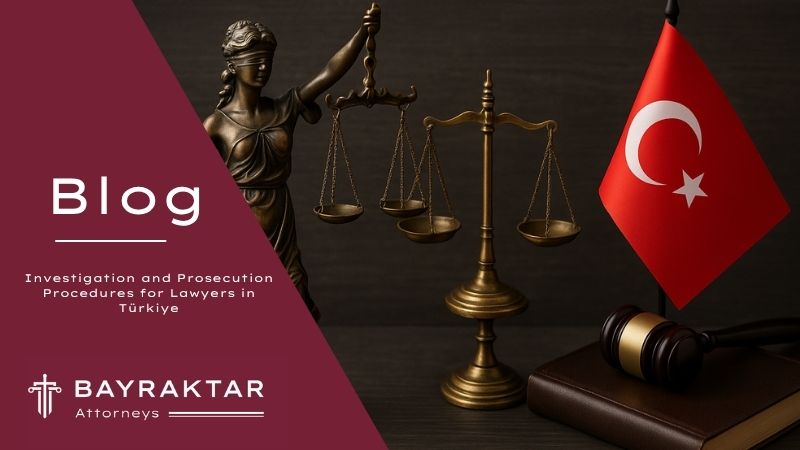
In Türkiye, real estate ownership is often subject to various legal annotations (şerhler) that are registered in the land registry. These annotations play a critical role in protecting rights, restricting certain transactions, and ensuring transparency in property dealings. For both Turkish citizens and foreigners, understanding these annotations is essential before entering into any real estate transaction.
At Bayraktar Attorneys, we provide full legal guidance on how annotations affect property rights, sales, and long-term ownership security. This blog explains the different types of annotations in Türkiye, their legal effects, and the processes related to adding or querying an annotation in the land registry.
What Does Annotation on Real Estate Mean?
An annotation (şerh) is a legal record entered into the land registry to restrict, secure, or condition the rights of the property owner. It functions as a legal warning or limitation, ensuring that certain rights or obligations tied to the property are respected by all current and future owners.
Annotations can result from court decisions, contracts, or specific legal provisions and may affect a property’s ability to be sold, transferred, or mortgaged.
Key Types of Annotations in Türkiye
Family Residence Annotation (Aile Konutu Şerhi)
Under the Turkish Civil Code, one spouse cannot sell, mortgage, or restrict rights on the family residence without the explicit consent of the other spouse.
Even if one spouse is not the official owner, they can request the land registry to record an annotation stating the property is a family residence.
The land registry officer cannot add this annotation automatically; it must be requested.
Transactions made without such consent are considered invalid, and the related registry entries may be deemed improper registrations.
Non-Transferable / Non-Sellable Annotation (Satılamaz/Devredilemez Şerhi)
A court may issue a precautionary injunction (ihtiyati tedbir) to prevent the sale or transfer of a property if there is a risk of significant damage, delay, or the loss of rights.
This annotation ensures the property cannot be sold until the court order is lifted.
Alternatively, a mortgage agreement with a maximum limit can also serve a similar protective function.
Right of Residence (Sükna Hakkı)
According to Articles 823–825 of the Turkish Civil Code:
A residence right can be granted to a specific individual (not a property) via a notarized contract.
It is registered in the “easement rights” section of the land registry.
The right cannot be transferred or inherited.
It ends with the death of the holder, the destruction of the property, or voluntary cancellation.
Right of Superficies (Üst Hakkı)
Under Articles 726 and 826–836 of the Turkish Civil Code:
This allows someone to build or maintain a structure above or below someone else’s land.
If granted for 30 years or more, it can be considered permanent and registered as an independent property right.
Requires an official notarized contract and registration.
Can be established for up to 100 years, extendable upon agreement.
Right of Usufruct (İntifa Hakkı)
Articles 794–822 of the Turkish Civil Code regulate this right:
Grants a person full use of another’s movable or immovable property.
It cannot be transferred or inherited but allows complete enjoyment of the property.
Remains valid even if the property is sold to another party, obligating the new owner to respect the usufruct right.
Pre-emption Right (Şufa Hakkı)
This is especially common in shared ownership (paylı mülkiyet):
If one co-owner decides to sell their share, other co-owners have the first right to purchase.
Must be offered formally through a notary.
Protects co-owners by preventing unwanted third-party entries into shared ownership.
Redemption Right (Vefa Hakkı)
The seller of a property can reserve the right to buy it back if the buyer decides to resell it.
This ensures the original seller retains some control over the future of the property.
Registered in the land registry to be legally enforceable.
Promise of Sale (Satış Vaadi Şerhi)
A notarized agreement that secures the right to purchase a property in the future.
Protects the buyer’s interest until the actual transfer of ownership occurs.
Commonly used in real estate projects and installment-based sales.
Can a Property with an Annotation Be Sold?
Yes, a property with an annotation can technically be sold. However, the buyer must accept and respect the existing annotation. In many cases, the annotation restricts the buyer’s ability to use or resell the property. For example:
A property with a family residence annotation cannot be transferred without spousal consent.
A property with a court-ordered sale restriction cannot be legally transferred until the order is lifted.
Therefore, due diligence is essential before purchasing a property with annotations. At Bayraktar Attorneys, we conduct full title deed checks to ensure our clients are protected from hidden risks.
Who Can Request an Annotation?
Annotations can be requested by:
Courts (for injunctions, restrictions, or precautionary measures).
Spouses (for family residence).
Creditors or banks (for mortgages or foreclosure-related annotations).
Notaries (for sale promises or usufruct rights).
Property owners themselves (in certain protective cases).
Documents Required for Adding an Annotation
The specific documents depend on the type of annotation, but common requirements include:
A notarized contract (for vefa, şufa, or sale promises).
Marriage certificate and municipality-issued documents (for family residence).
Official ID and registry extracts of the applicant.
Earthquake insurance policy (DASK).
Court orders (for precautionary measures).
Querying Property Annotations
Thanks to the Turkish Land Registry and Cadastre General Directorate, annotation inquiries can now be done online via the Tapu Bilgileri Sorgulama Sistemi. Access requires identity verification through:
e-Government (e-Devlet)
Mobile Signature
Electronic Signature
Turkish ID Card
Bank verification
This digital system provides transparency and security for foreign and local buyers alike.
Conclusion
Annotations on real estate in Türkiye serve as critical legal tools to protect family rights, secure creditors, and ensure fair dealings among property owners. However, they also introduce significant restrictions that buyers must be aware of before proceeding with any transaction.
At Bayraktar Attorneys, we provide expert guidance to foreigners and investors navigating the complexities of the Turkish real estate system. From conducting title deed due diligence to handling annotation registrations or disputes, our team ensures your property rights are fully protected.





![["A gavel, separated wedding rings, and Turkish legal documents with a Turkish flag, symbolizing the legal consequences of divorce in Türkiye"]](https://admin.bayraktarattys.com/api/admin/images/images/projects/765770dc-c7ce-4ea1-ae8b-99b96a482da5_divorce-in-turkey-legal-documents.jpg)
